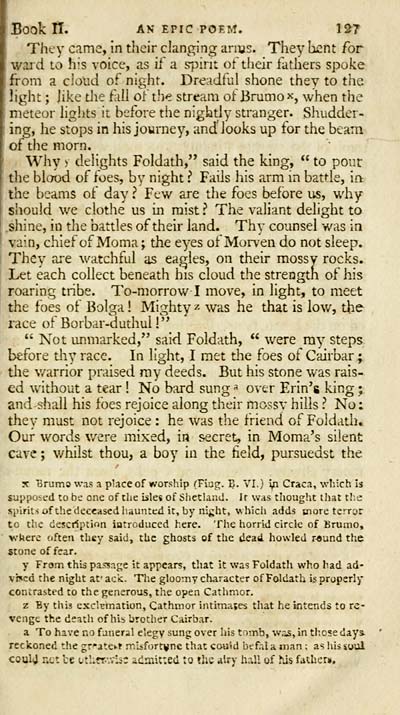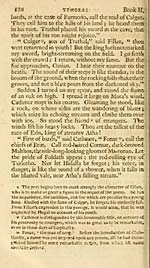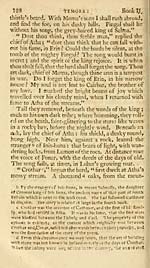Download files
Complete book:
Individual page:
Thumbnail gallery: Grid view | List view

Book It. AS EPIC POF.M. 1ST
They came, in their clanging arms. They bent for
wajcl to his voice, as if a spirit ot tlieir fathers spoke
from a cloud of" nighr. Dreadful shone they to the
light ; like the fill of th^ stream of Brumo^, when the
meteor lights it before the nightly stranger. Shudder-
ing, he stops in his jowrney, and looks up for the beani
of the morn.
Why y delights Foldath," said the king, " to pour
the blood of foes, by night ? Fails his arm in battle, m
the beams of day ? Few are the foes before us, why
should we clothe us in mist ? The valiant delight to
shine, in the battles of their land. Thy counsel was in
vain, chief of Moma; the eyes of Morven do not sleep.
They ai'e watchful as eaj^les, on their mossy rocks.
I>et each collect beneath his cloud the streogtn of his
roaring tribe. To-morrow I move, in light, to meet
the foes of Bolga ! Mighty z was he that is low, the
race of Borbar-duthul !"
" Not immarked," said Foldath, " were my steps
before thy race. In light, I met the foes of Cairbar ;
the v/arrior praised my deeds. But his stone was rais-
ed without a tear ! No bard sung ^ over Erin's king ;
and shall his foes rejoice along their mossv hills ? No;
they must not rejoice : he was the friend of Foldath,
Our words v/ere mixed, in secret, in Moma's silent
cave ; v/hilst thou, a boy in the field, pursuedst the
X Brumo was a place of worship (Fiug. B. VI.) i^ Craca, which is
supposed to be one of the isles of Shetland. Ir was thought that the
spirits ofthe deceased haunted it, by night, whicii adds more terror
to the description introduced here. The horrid circle of Brume,
where often they said, the ghosts of the dead howled r^und the
stone of fear.
y From this passage it appears, that it was Foldatli who had ad-
vised the night af ack. The gloomy character of Foldath is properly
contrasted to the generous, the open Cathmor.
z By this exchmation, Cathmor intimajes that he intends to re-
venge the death of his brother Cairbar.
a To have no funeral elegy sung over his tnmb, wis, in those days,
reckoned the gr-atei-t misfortune th.at could befila man ; as liissoul
coulj r.Lt be (.tLrr.v.ii: iclinit:ed to the airy hall of Ms fdther».
They came, in their clanging arms. They bent for
wajcl to his voice, as if a spirit ot tlieir fathers spoke
from a cloud of" nighr. Dreadful shone they to the
light ; like the fill of th^ stream of Brumo^, when the
meteor lights it before the nightly stranger. Shudder-
ing, he stops in his jowrney, and looks up for the beani
of the morn.
Why y delights Foldath," said the king, " to pour
the blood of foes, by night ? Fails his arm in battle, m
the beams of day ? Few are the foes before us, why
should we clothe us in mist ? The valiant delight to
shine, in the battles of their land. Thy counsel was in
vain, chief of Moma; the eyes of Morven do not sleep.
They ai'e watchful as eaj^les, on their mossy rocks.
I>et each collect beneath his cloud the streogtn of his
roaring tribe. To-morrow I move, in light, to meet
the foes of Bolga ! Mighty z was he that is low, the
race of Borbar-duthul !"
" Not immarked," said Foldath, " were my steps
before thy race. In light, I met the foes of Cairbar ;
the v/arrior praised my deeds. But his stone was rais-
ed without a tear ! No bard sung ^ over Erin's king ;
and shall his foes rejoice along their mossv hills ? No;
they must not rejoice : he was the friend of Foldath,
Our words v/ere mixed, in secret, in Moma's silent
cave ; v/hilst thou, a boy in the field, pursuedst the
X Brumo was a place of worship (Fiug. B. VI.) i^ Craca, which is
supposed to be one of the isles of Shetland. Ir was thought that the
spirits ofthe deceased haunted it, by night, whicii adds more terror
to the description introduced here. The horrid circle of Brume,
where often they said, the ghosts of the dead howled r^und the
stone of fear.
y From this passage it appears, that it was Foldatli who had ad-
vised the night af ack. The gloomy character of Foldath is properly
contrasted to the generous, the open Cathmor.
z By this exchmation, Cathmor intimajes that he intends to re-
venge the death of his brother Cairbar.
a To have no funeral elegy sung over his tnmb, wis, in those days,
reckoned the gr-atei-t misfortune th.at could befila man ; as liissoul
coulj r.Lt be (.tLrr.v.ii: iclinit:ed to the airy hall of Ms fdther».
Set display mode to: Large image | Transcription
Images and transcriptions on this page, including medium image downloads, may be used under the Creative Commons Attribution 4.0 International Licence unless otherwise stated. ![]()
| Early Gaelic Book Collections > Ossian Collection > Poems of Ossian, the son of Fingal > Volume 2 > (137) |
|---|
| Permanent URL | https://digital.nls.uk/77914412 |
|---|
| Shelfmark | Oss.54 |
|---|---|
| Attribution and copyright: |
|
| Description | Selected books from the Ossian Collection of 327 volumes, originally assembled by J. Norman Methven of Perth. Different editions and translations of James MacPherson's epic poem 'Ossian', some with a map of the 'Kingdom of Connor'. Also secondary material relating to Ossianic poetry and the Ossian controversy. |
|---|
| Description | Selected items from five 'Special and Named Printed Collections'. Includes books in Gaelic and other Celtic languages, works about the Gaels, their languages, literature, culture and history. |
|---|

